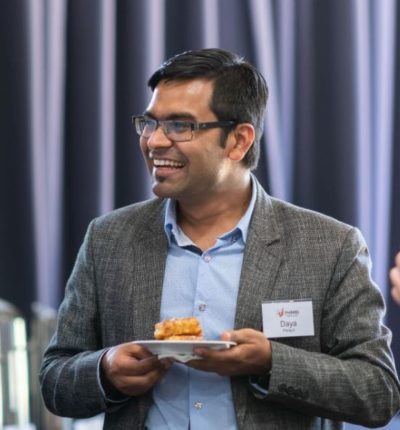
Daya is a Research Assistant with Flinders University Rural Health SA, based at our site in Renmark. His role is to support the research group based there with the development of proposals, ethics applications, literature reviews, supporting rural agendas, and to also work with Advanced Studies MD students to design their research projects.
But that’s really only what you see on the surface with Daya. When you scratch a little deeper, you find out that his contribution and expertise is far more considerable.
What’s your research background? I’m actually a registered Pharmacist in Nepal. I have a lot of experience in my home country, particularly with academia and community pharmacy. I was working as a lecturer in a University in Nepal; teaching and doing some research. But somewhere along the way, I became much more interested in research and desired to expand my research skills further. That interest led me all the way here to Flinders where, in 2015 and on a FIPRS Scholarship, I commenced a PhD which examined the role of the pharmacist in the management of chronic heart failure. The support and mentorship I received along the way really shaped me as a person. My supervisors, Dr Dean Whitehead and Professor Ross McKinnon, are leaders in their fields and inspired me to approach my research in ways that I previously hadn’t considered.
So my experience is quite broad: I have practical knowledge and experience working in molecular biology research in a wet lab, and now I’m getting experience in clinical research, looking at how can a pharmacist in a multidisciplinary team make a difference. My research interest is particularly focused on evidence-based practice, cardiovascular disease management, medication management, clinical pharmacology, healthy ageing, mental health, and rural health.
Do you have a mentor? Not formally no, but my supervisors have always provided me with valuable guidance and advice. But I mentor, yes. I was the founder vice president and the president later of the Nepalese student club here at Flinders. I had an opportunity for mentoring Nepalese students.
What piece of advice would you give to aspiring professional research staff? We all have our duties, roles, and professional responsibilities, but it is very important to stay excited about your work – you have to retain your passion! That’s the wonderful part of being a researcher – we have this character trait which ties us to a specific area and really enthuses us. But also, we all need to remember to look after ourselves, mentally and physically. Our personal wellbeing and work / life balance is such an important part of our lives, and it’s easy to take it for granted sometimes.
What is something about yourself others may not know? One of the biggest challenges of moving to a new country with a culture that is markedly different to your own is navigating the social and bureaucratic structures. I’m sure this is a common feeling! I didn’t have a bad experience, but there were definite challenges and I wanted to try to make the transition easier for people. So, it was a privilege to start the Nepalese student club at Flinders as a way of offering support, guidance, and assistance to students, particularly the new arrivals. I have also been actively involved in different Nepalese social organisations. Recently, I was invited by three different leading universities in Nepal to share my expertise on clinical research and talk about opportunities for pharmacy graduates here in Australia. More recently, I was an event coordinator for a job-hunting program organised by ONUF, one of the Nepalese organisations in collaboration with a COVID-19 task force team. This program was targeted for the new arrivals who were affected by the COVID-19 pandemic.
What do you value most about working at Flinders? Maybe it’s because I was a student here, but I feel a very strong connection to this University. I came here because of its reputation for excellence and innovation, and even though it is world class, it retains its firm commitment to rural and remote communities. I can honestly say that, once I graduated with my PhD, my priority was to continue working here.
What’s one thing you couldn’t live without? That’s easy: my family! I have a wife and two young children who bring me great joy each day. I am also in constant touch with my family and relatives in my home country. Also, and this is probably a characteristic of being in a rural community – my work colleagues. I have a real sense of family when I come to work.
What are you doing in Renmark?! Ha, that’s a good question. You know, I was born in a rural village in Nepal and I honestly have a deep connection with rural locations. They feel cosier to me, and I like the sense of community that a small town can give. It’s nice being a part of a community, not just someone who is in it. So, after a chance meeting with Dr Vivian Isaac (Research lead), I decided to move into this position. It’s a nice fit for me and for my family. Also, would you believe that there is a big transient population of 150 Nepalese who travel through here working in different industries so that’s always nice too.

